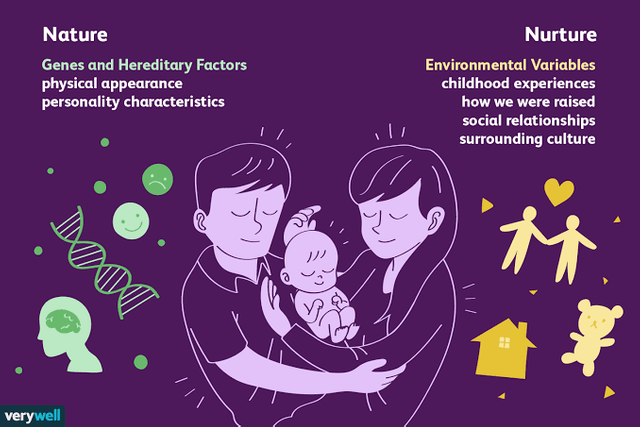Nature-Nurture Controversy of Language Development
In course of human development, the issue of whether language development is a matter of natural endowment or it is because of learning or nurture has been a topic of hot debate.
Which side do you think is right?

Credit
Have you ever wondered why humans, especially children possess an incredible ability of acquiring language? This is unlike an adult who struggles to learn a language. Your first confusion here might be what is the difference between acquiring a language and learning a language? The former, language acquisition, is an unconscious act of understanding the structural make-up of a language while the latter, language learning, is a conscious act of understanding the structure of a language. This then explains why children have incredible ability over adults in acquiring /learning new language when they are exposed to a language.
Over the years, there have been attempts to account for why humans have the ability to acquire language especially children. Whether children are born with **blank sheets** in their head as far as language is concerned or whether humans are equipped with a *programmed* knowledge of the structure of language? This brought about two powerful schools of thought who shared interesting views concerning the bone of contention. It's like a tug of war with each theorist standing at one end of the rope.
B. F. Skinner's functional approach to behavioral psychology otherwise known as behaviourism is an attempt to explain the behaviour of organisms, human and otherwise. The central tenet of behaviourism is that everything which some refers to as mental activity, with the inclusion of language acquisition and use, can be explained in terms of habits (patterns of stimulus and response), built up over the years through conditioning (Agbedo, 2009). In language development, behaviourism asserts that a person's response is traceable to a particular stimulus-response interplay. It seeks to known and understand which of the stimuli in the environment prompted and whether this stimuli can be reinforced. Hence, according to Skinner's approach, language is a set of habits built up over the years. It favours the Nurture Argument of language development.
Using his rat-in-a-box experiment published in his book entitled *Verbal behaviour*, Skinner excused any kind of innate or mental ability in language development as an aspect of human behaviour. To him, the environment is the chief factor of children's ability to acquire language which is necessary through *trial and error.* This is what he referred to as **operant conditioning** (voluntary response). He referred to it as *operant* because language is one of the behaviour that has no causal agent, that is, there is no particular reference to any stimulus that cause its response in the environment. The variables Skinner used in putting forward his views are *stimulus-reinforcement-deprivation-* and *-response*.
A scholar known as Malmkjaer encapsulated Skinner's claims to be as quoted in (Agbedo, 2009):
(a) language as a form of human behaviour can be explained in a way that in principle doesn't differ from the behaviour of rats in laboratory.
(b) language is explainable in terms of observable terms without reference to the internal structure of organisms.
(c) this descriptive system is superior to others because it's terms of can be defined just like experimental conditions
(d) So, it is able to deal with semantics in a scientific manner.
Skinner theory has its flaws. Chomsky (1959) criticized it based on two claims:
1) The behaviour of rats-in-a-box is not applicable to human
2) That Skinner clearly does not understand the nature of language
**Chomsky** then proposed the mentalistic theory of language development which argues that language is a mental process and that every normal child is born with the innate linguistic ability to understand the structure of a language. This innate ability is what he called **Language Acquisition Device (LAD)**. This then favours the **Nature Argument of language development**. Chomsky pinpointed some of the peculiar qualities that characterise language, where he aired that Skinner was not qualified to talk about language since he (Skinner) knew nothing about such verbal behaviour (Aitchson, 1976). Chomsky stressed that language is structural-dependent by which he meant that language is not merely about stringing sequence of words together but that every language (sentence) has an inaudible internal structure which the hearer must decode.
Although, none of the views above wins the argument because they tend to overlap in practice. Any human being is able to use language because he/she has the required mental abilities and organs. However, it will be hard for the human to acquire or learn language when he/she is not in an environment where their is language and if he/she does not cultivate the of acquiring the language.
References
Agbedo, C.U (2009). Language and Mind: New Directions in Psycholinguistics. Nsukka: ACE Resources Konzult.
Aitchson, J. (1976). The Articulate Mammal: An Introduction to Psycholinguistics. London: Hutchinson & Co. Publishers Ltd.
Chomsky, Noam (1957).Review of B. F. Skinner, Verbal Behaviour. Language. vol. 35,pg. 26-54.
Thank you for visiting my blog. Much love till another day.